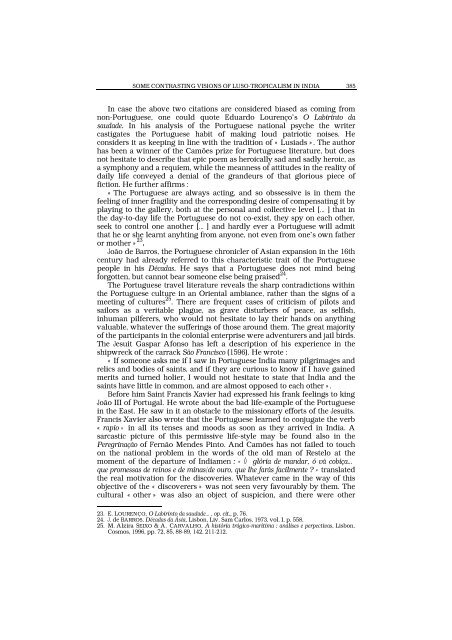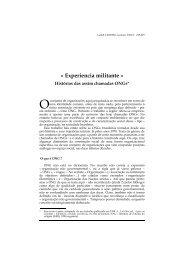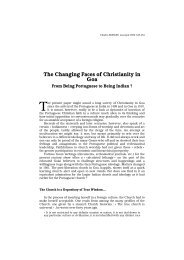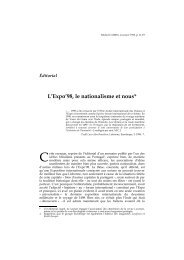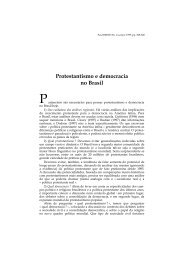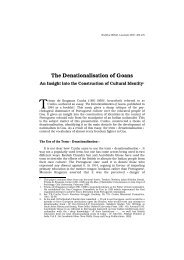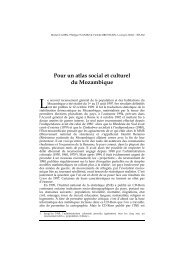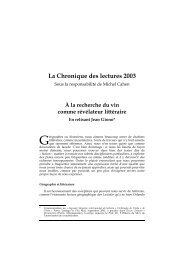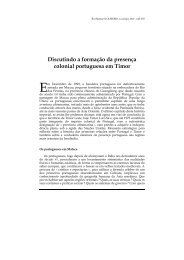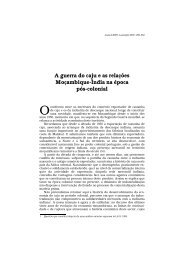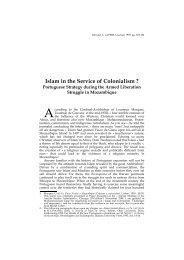some contrasting visions of luso-tropicalism in india - Lusotopie
some contrasting visions of luso-tropicalism in india - Lusotopie
some contrasting visions of luso-tropicalism in india - Lusotopie
Create successful ePaper yourself
Turn your PDF publications into a flip-book with our unique Google optimized e-Paper software.
SOME CONTRASTING VISIONS OF LUSO-TROPICALISM IN INDIA 385In case the above two citations are considered biased as com<strong>in</strong>g fromnon-Portuguese, one could quote Eduardo Lourenço’s O Labir<strong>in</strong>to dasaudade. In his analysis <strong>of</strong> the Portuguese national psyche the writercastigates the Portuguese habit <strong>of</strong> mak<strong>in</strong>g loud patriotic noises. Heconsiders it as keep<strong>in</strong>g <strong>in</strong> l<strong>in</strong>e with the tradition <strong>of</strong> « Lusiads ». The authorhas been a w<strong>in</strong>ner <strong>of</strong> the Camões prize for Portuguese literature, but doesnot hesitate to describe that epic poem as heroically sad and sadly heroic, asa symphony and a requiem, while the meanness <strong>of</strong> attitudes <strong>in</strong> the reality <strong>of</strong>daily life conveyed a denial <strong>of</strong> the grandeurs <strong>of</strong> that glorious piece <strong>of</strong>fiction. He further affirms :« The Portuguese are always act<strong>in</strong>g, and so obssessive is <strong>in</strong> them thefeel<strong>in</strong>g <strong>of</strong> <strong>in</strong>ner fragility and the correspond<strong>in</strong>g desire <strong>of</strong> compensat<strong>in</strong>g it byplay<strong>in</strong>g to the gallery, both at the personal and collective level [… ] that <strong>in</strong>the day-to-day life the Portuguese do not co-exist, they spy on each other,seek to control one another [… ] and hardly ever a Portuguese will admitthat he or she learnt anyht<strong>in</strong>g from anyone, not even from one’s own fatheror mother » 23 .João de Barros, the Portuguese chronicler <strong>of</strong> Asian expansion <strong>in</strong> the 16thcentury had already referred to this characteristic trait <strong>of</strong> the Portuguesepeople <strong>in</strong> his Décadas. He says that a Portuguese does not m<strong>in</strong>d be<strong>in</strong>gforgotten, but cannot bear <strong>some</strong>one else be<strong>in</strong>g praised 24 .The Portuguese travel literature reveals the sharp contradictions with<strong>in</strong>the Portuguese culture <strong>in</strong> an Oriental ambiance, rather than the signs <strong>of</strong> ameet<strong>in</strong>g <strong>of</strong> cultures 25 . There are frequent cases <strong>of</strong> criticism <strong>of</strong> pilots andsailors as a veritable plague, as grave disturbers <strong>of</strong> peace, as selfish,<strong>in</strong>human pilferers, who would not hesitate to lay their hands on anyth<strong>in</strong>gvaluable, whatever the suffer<strong>in</strong>gs <strong>of</strong> those around them. The great majority<strong>of</strong> the participants <strong>in</strong> the colonial enterprise were adventurers and jail birds.The Jesuit Gaspar Afonso has left a description <strong>of</strong> his experience <strong>in</strong> theshipwreck <strong>of</strong> the carrack São Francisco (1596). He wrote :« If <strong>some</strong>one asks me if I saw <strong>in</strong> Portuguese India many pilgrimages andrelics and bodies <strong>of</strong> sa<strong>in</strong>ts, and if they are curious to know if I have ga<strong>in</strong>edmerits and turned holier, I would not hesitate to state that India and thesa<strong>in</strong>ts have little <strong>in</strong> common, and are almost opposed to each other ».Before him Sa<strong>in</strong>t Francis Xavier had expressed his frank feel<strong>in</strong>gs to k<strong>in</strong>gJoão III <strong>of</strong> Portugal. He wrote about the bad life-example <strong>of</strong> the Portuguese<strong>in</strong> the East. He saw <strong>in</strong> it an obstacle to the missionary efforts <strong>of</strong> the Jesuits.Francis Xavier also wrote that the Portuguese learned to conjugate the verb« rapio » <strong>in</strong> all its tenses and moods as soon as they arrived <strong>in</strong> India. Asarcastic picture <strong>of</strong> this permissive life-style may be found also <strong>in</strong> thePeregr<strong>in</strong>ação <strong>of</strong> Fernão Mendes P<strong>in</strong>to. And Camões has not failed to touchon the national problem <strong>in</strong> the words <strong>of</strong> the old man <strong>of</strong> Restelo at themoment <strong>of</strong> the departure <strong>of</strong> Indiamen : « Ó glória de mandar, ó vã cobiça…que promessas de re<strong>in</strong>os e de m<strong>in</strong>as/de ouro, que lhe farás facilmente ? » translatedthe real motivation for the discoveries. Whatever came <strong>in</strong> the way <strong>of</strong> thisobjective <strong>of</strong> the « discoverers » was not seen very favourably by them. Thecultural « other » was also an object <strong>of</strong> suspicion, and there were other23. E. LOURENÇO, O Labir<strong>in</strong>to da saudade… , op. cit., p. 76.24. J. de BARROS, Décadas da Ásia, Lisbon, Liv. Sam Carlos, 1973, vol. I, p. 558.25. M. Alzira SEIXO & A. CARVALHO, A história trágico-marítima : análises e perpectivas, Lisbon,Cosmos, 1996, pp. 72, 85, 88-89, 142, 211-212.


